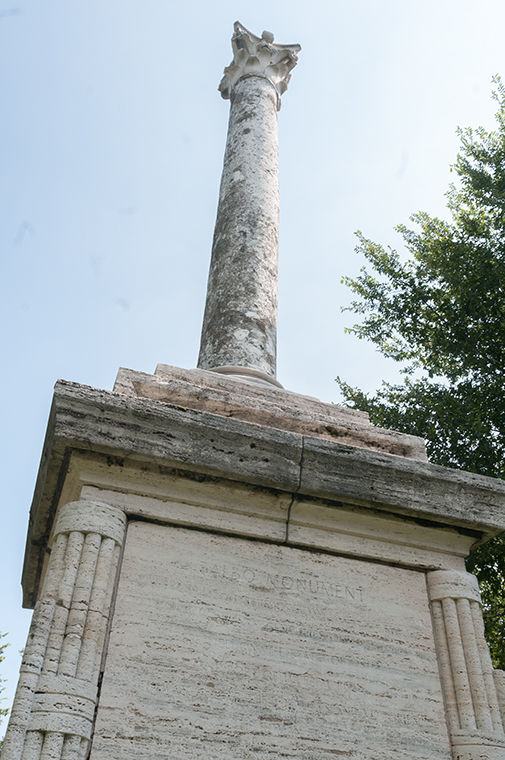Chicago monuments at heart of controversy
September 5, 2017
Engraved into the front of an 18-foot-tall Roman column that sits along the Lakeshore trail bike path near Soldier Field are the words: “Fascist Italy with the sponsorship of Benito Mussolini presents to Chicago this commemoration of a flight by Balbo in the 11th year of the Fascist Era,” according to an Aug. 18 Chicago Tribune article.
The monument, a gift from former Italian Prime Minister Benito Mussolini in 1934, honors Air Force Marshal Italo Balbo’s trans-Atlantic flight from Rome to Chicago during the 1933 World’s Fair. Former Chicago Mayor Ed Kelly also renamed 7th Street to Balbo Avenue that year to honor the flight.
Mayor Rahm Emanuel said he would be open to removing the Balbo statue and changing the name of the street at an Aug. 23 City Council meeting.
“The whole concept of street naming and monuments is honorific,” said Anthony Cardoza, a modern European history professor at Loyola University Chicago. “Why are we honoring a person who was a fascist warlord and a key figure within the fascist regime?”
Balbo was an Italian aviator, important to Mussolini’s rise to power and became a feared military leaders. Not long after his visit to Chicago, Balbo led the bombing of unarmed Africans in Ethiopia during World War II.
This is not the first time someone has tried to remove the Balbo monument. Following WWII, an alderman petitioned to have it taken down in 1946, and various groups over the years have tried to change the street’s name. In 2011, Cardoza was involved in a campaign to change the name.
The monument was brought up again just two weeks after a white nationalist rally in Charlottesville, Virginia, turned violent, killing one protester and injuring 19 other protesters.
“I don’t think it is by chance that the move to change the name of Balbo Avenue coincides with this movement to eliminate a lot of the Confederate statues,” Cardoza said, “especially with the political climate that has emerged in the United States, particularly since the election of the 2016.”
Bill Savage, an associate professor of instruction at Northwestern University, has taken part in a social media movement to rename the downtown street. He said the monument is no longer in context and could be compared to having a statue of WWII German soldiers standing in downtown Chicago.
“I totally understand why Mayor Kelly would put up this monument and rename the street to honor Italian Americans in 1933, but not now. It’s 2017,” Savage said.
Balbo Avenue is a three block section of downtown where thousands of tourists walk every year.
“It’s right there in the heart of the city,” Savage added. “If our heart has room for a fascist, we need to look at our heart.”
There are also groups against removing the monument and re-naming the street. Dominic DiFrisco, president-emeritus of the Joint Civic Committee of Italian-Americans, publicly denounced the campaign following Emanuel’s comments.
DiFrisco did not respond to requests for comment as of press time.
Balbo’s is not the only controversial monument in the city. On the corner of Martin Luther King Jr. Drive and 51st Street is the George Washington statue—named after the founding president—with nearby Jackson Park named after President Andrew Jackson.
Bishop James Duke of the Christian Liberation Church is asking Emanuel and the city to remove the statue of George Washington and change the park names, arguing the city should not place statues of slave owners in black communities.
Duke did not respond to request for comment as of press time.
Errick Shambley, 49, has lived in the Washington Park area since 1979. As he sat under the Washington statue, he looked up and shook his head.
“[The statue is] not appropriate,” Shambley said. “It shouldn’t have got up there in the first place. Majority of the people here don’t even know what [Washington] did, or why he was even put up there.”
However, Emanuel was not in favor of making changes to Washington and Jackson Parks.
“I’m against changing the names. Those are presidents who actually worked at liberty and perfecting the union,” Emanuel said.
Advocacy groups want to change the names to honor Harold Washington, the first black Chicago mayor, and Jesse Jackson, a civil rights activist.
“It’s appropriate for this to be named after Harold Washington,” Shambley said. “He deserves it. This was his city. See, I want them to tell me why George Washington was put up here in the first place, out of all the presidents.”








